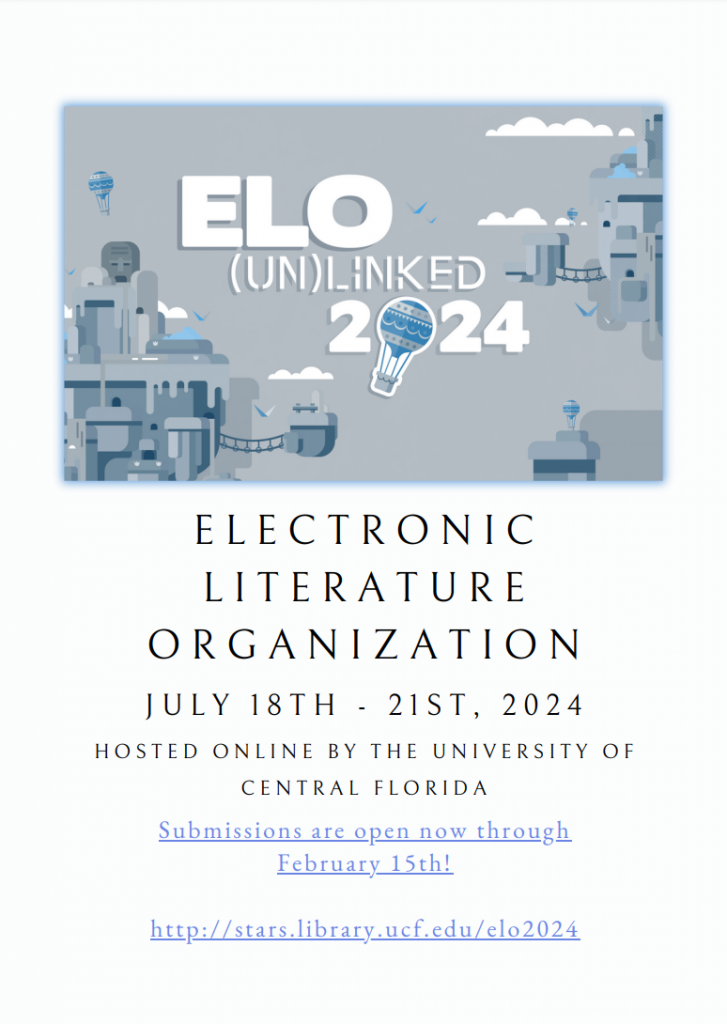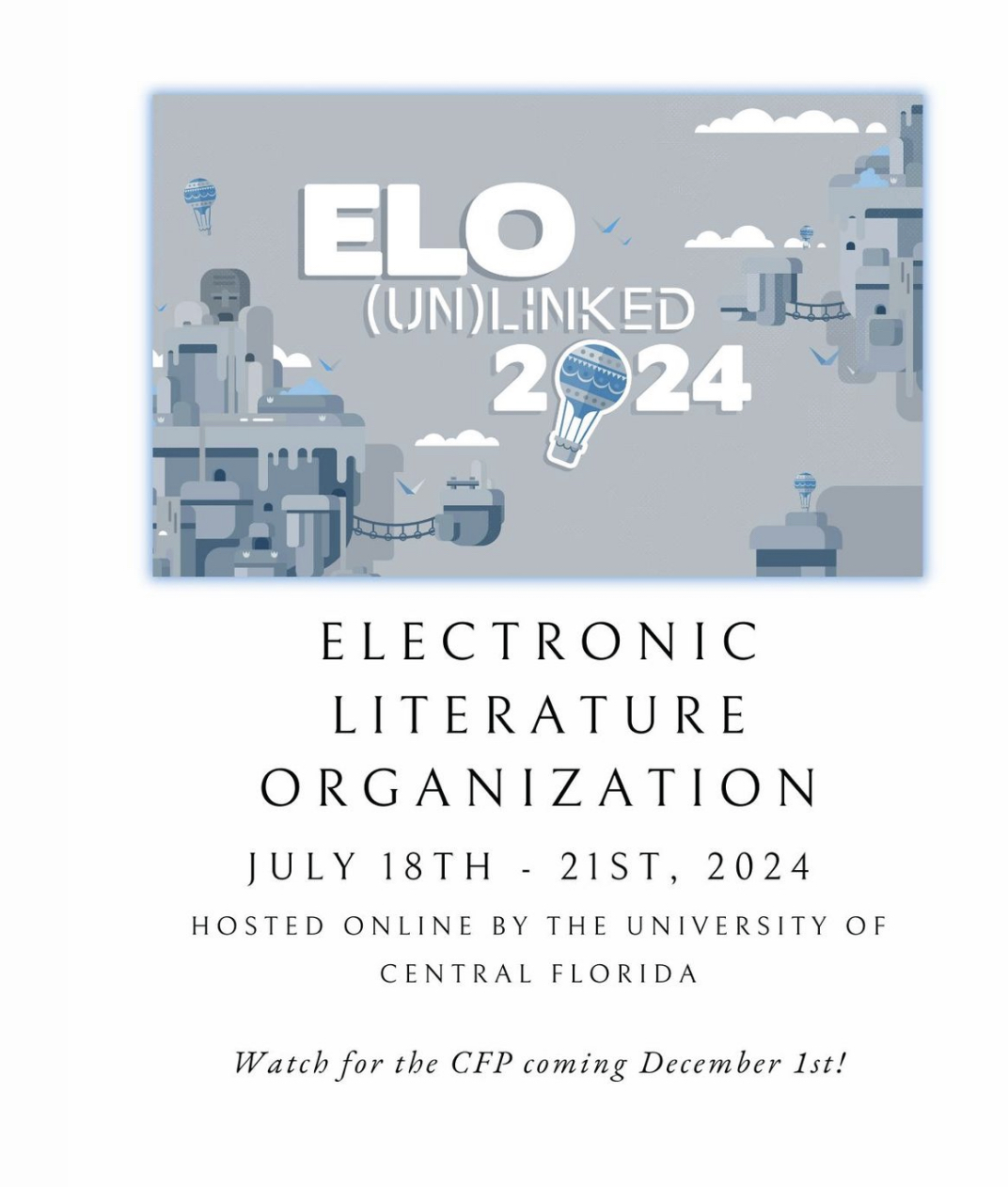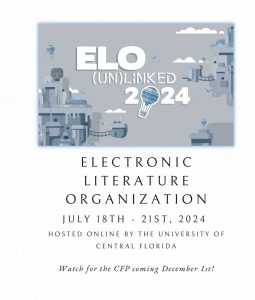ELECTRONIC LITERATURE ORGANIZATION 2023 INTERNATIONAL CONFERENCE AND MEDIA ARTS SHOW
OVERCOMING DIVIDES: ELECTRONIC LITERATURE AND SOCIAL CHANGE
JULY 12-15, 2023 – COIMBRA, PORTUGAL
Deadline January 31
(CFP: updated January 20, 2023)
Join us this summer for four days of digital art and scholarship at the ELO 2023 Conference and Media Arts Show in beautiful Coimbra, Portugal, the 12th to the 15th of July.
The 2023 conference, “Overcoming Divides: Electronic Literature and Social Change,” advocates the dismantlement of economic, political, linguistic, and cultural barriers, focusing on the relation between art and society, as well as on the subversive potential of electronic literature.
Art and literature compulsively respond to undergoing socio-political transformations. Whether overtly committed to social causes or inevitably engulfed by waves of change, writers and artists are influenced by dramatic shifts motivated by local or global issues such as climate change, economic crisis, military conflicts, and repressive or coercive government policies. The field of electronic literature, whose continuous reconfiguration is deeply intertwined with technological advancements, is no exception to this pattern. Equipped with the pervasiveness of network technology, as well as with software that can analyze and portray reality with the utmost detail, electronic literature is harnessed with adequate tools to voice environmental and social concerns and to expose oppressive and corrupt regimes. Highly experimental and focused on an introspective journey that aims to explore the creative amplitude of emerging technologies, electronic literature’s self-reflexive nature is also frequently mobilized to defy normative perspectives over literature and art, as well as to challenge deep-rooted cultural misconceptions.
During this conference, we aim to explore how electronic literature uses its critical media approach, as well as its close affinity with computation, to assume a socially engaged stance. In a time when walls are being raised once again, this conference examines electronic literature’s role in the dismantlement of new and old barriers between people.
ELO23 will be held in a national monument (Convento São Francisco), overlooking the University of Coimbra as well as Coimbra’s Uptown and Downtown areas, both designated World Heritage by UNESCO in 2013. Challenging the social asymmetry represented by the uptown/downtown divide, ELO23 will be extended from the university to the entire city center. Performances will be opened to the public, and exhibitions will take place at different locations in the city, thus integrating ELO Conference into Coimbra’s rich cultural life. Remote (online) participation will be limited to the scholarly dimension of the conference.
We welcome scholarly and artistic proposals that explore a connection between electronic literature and the following themes, among others:
- the role of literature in social change;
- collaborative platforms and activist software;
- digital humanities and memory preservation (archive);
- environmental damage caused by digital technologies;
- the impact of climate change;
- language barriers, translation and linguistic diversity;
- disabilities and accessibility;
- mental health, trauma and cognitive diversity;
- social and economic inequality;
- digital literacy and societal transformation;
- gender divide and identity diversity;
- migrations and border enforcement;
- hybridity, recombination and multilinearity as aesthetics of subversion;
- documentary forms and nonfiction narrative.
Organizers
Electronic Literature Organization (ELO)
Faculdade de Letras da Universidade de Coimbra (FLUC)
Partners and Sponsors
Center for Portuguese Literature (CLP)
Instituto de Comunicação da NOVA (ICNOVA), Universidade Nova de Lisboa
Programa de Doutoramento em Materialidades da Literatura, Universidade de Coimbra
Universidade Fernando Pessoa (UFP)
Câmara Municipal de Coimbra
Exploratório – Centro Ciência Viva de Coimbra
Museu da Ciência da Universidade de Coimbra
Berkeley Center for New Media
How to submit your proposals
How to submit your proposals
All proposals will undergo a rigorous double-blind peer review process. Please read the instructions carefully. You may submit only one proposal for each mode of participation (paper/panel; workshop; artwork; performance).
ACADEMIC PRESENTATIONS: PANELS AND PAPERS
We welcome submissions for stand-alone papers as well as organized panels. Individual submissions for stand-alone papers should include an abstract (250-350 words), as well as a short list of references (4-6 main works). Individual papers will be presented as part of conference organized panels. Each presentation will be 15 minutes long, followed by a 20-minute Q&A. Please specify in your submission if this presentation will be in person or online.
Three or four-person panels should include a brief overview of the panel’s rationale (100-150 words), as well as individual abstracts of each presentation: abstracts (250-350 words), including a short list of references (4-6 main works). Panels will have a total presentation time of one hour, and should allow for a 20 minute Q&A section. Please specify in your submission whether this panel will be in person or fully online. Hybrid panels will not be supported.
Please submit via Easy Chair <https://easychair.org/conferences/?conf=elo2023> by January 31, 2023, 11:59pm EST. While proposals should be in English, panels can be presented in other languages. Note that no translation services will be offered. In case of acceptance, abstracts will be included in the program and proceedings.
Participants will be notified of acceptance by February 20, 2023.
WORKSHOPS
We welcome submissions for hands-on and participatory workshops. Proposals should include a 250-350 word abstract (as well as a short list of references if applicable; 4-6 main works). Please specify in your proposal the structure of the workshop, any tangible outcomes (if any), pedagogical goals, expectations from participants, requirements for participants (previous knowledge, technical expertise, devices needed, etc.). Make sure you describe any technical requirements for your workshop’s implementation at the conference.
All workshops will have an allocated time of 2 hours. Please specify in your submission if this workshop will be in person or online.
Please submit via Easy Chair <https://easychair.org/conferences/?conf=elo2023> by January 31, 2023, by 11:59pm EST. While proposals should be in English, workshops can be presented in other languages. Note that no translation services will be offered. In case of acceptance, abstracts will be included in the program and proceedings.
Participants will be notified of acceptance by February 20, 2023.
ARTWORK: EXHIBITION OF DIGITAL WORK
We welcome submissions for two different public exhibitions addressing (1) environmental issues and (2) social issues, i.e., repression, inequality, and segregation.
Please send proposals including an artist statement (250-350 words) detailing the aesthetic intentions, the structure of the piece, and its relationship to the conference and chosen exhibition theme (Exhibition 1 or Exhibition 2). In addition, provide documentation of the work (URLs), author name(s), biographical note(s), and specific technical requirements for display at the exhibition venue.
Please submit via Easy Chair <https://easychair.org/conferences/?conf=elo2023> by January 31, 2023, 11:59pm EST. Proposals should be in English, but displayed work can be in other languages. In case of acceptance, artist statements will be included in the program and proceedings.
Artists will be notified of acceptance by February 20, 2023.
PERFORMANCES
ELO23 will host two nights of performances open to conference participants and the general public. We welcome performance proposals addressing the conference’s main theme of electronic literature and social change.
Please submit proposals including an artist statement (250-350 words) detailing the aesthetic intentions, the structure of the piece, and its relationship to the conference theme. In addition, provide the author name(s), biographical note(s), and a description (250 words max.) of the nature of the performance, as well as any technical requirements.
Please submit via Easy Chair <https://easychair.org/conferences/?conf=elo2023> by January 31, 2023, 11:59pm EST. Proposals should be in English, but performances can be in other languages. In case of acceptance, artist statements will be included in the program and proceedings.
Performers will be notified of acceptance by February 20, 2023.
//||\\//||\\//||\\//||\\//||\\
As with any ELO event, ELO23 will follow the organization’s code of conduct. We are committed to providing an inclusive, equitable, and harassment-free experience for everyone, regardless of gender, gender identity and expression, sexual orientation, disability, physical appearance, body size, age, race, class, religion, or linguistic and cultural background. For more information, please refer to https://eliterature.org/about/code–of–conduct/
Chairs
Daniela Côrtes Maduro (Universidade de Coimbra)
Manuel Portela (Universidade de Coimbra)
Alex Saum-Pascual (University of California, Berkeley)
Rui Torres (Universidade Fernando Pessoa)
Feel free to contact us: eloconference2023@gmail.com.




